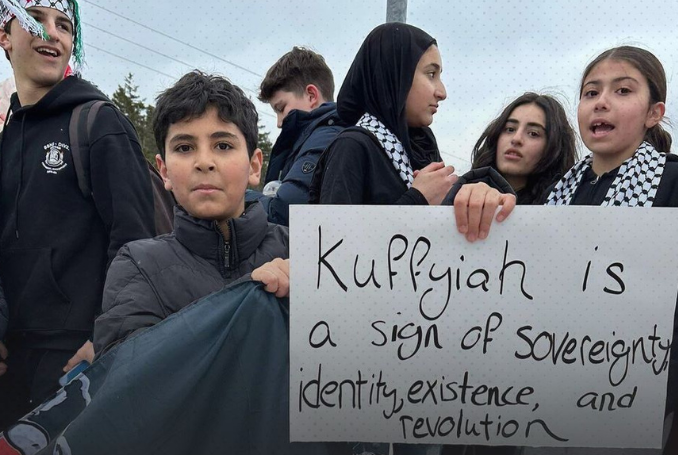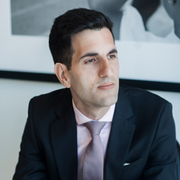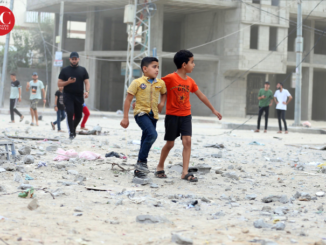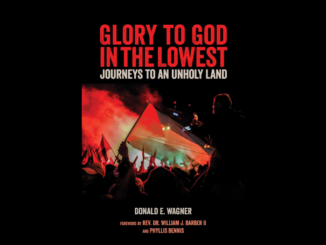
Last week in Halifax several students were asked to remove their Kufiyahs, known to many as the checkered (black and white) Palestinian scarf, from their person at Park West School. To boot this was during a “Culture Day” at the school to honor the uniqueness and diversity of different peoples.
Saltwire reported that according to Lana Khammash, president of the Atlantic Canada Palestinian Society (ACPS), the principal told students that the Kufiyah signified “war.” The Maritimes news outlet however, like several others, did not make clear whether it was the principal themselves who asked the kufiyahs be removed.
It’s surely bad enough when anyone, let alone young people, is asked to remove their Kufiyah —representing the strength, resilience, and unity of the Palestinian people. An entirely positive symbol, there is no reason why someone should ever be asked to take it off.
I reached out to Khammash to learn more about what happened at Park West. By phone, she shared with me that, according to information ACPS obtained, “[The principal] gave instructions [to staff]…that if the kids in the classroom are wearing the kufiyahs tell them to remove it. …[If they don’t] they will be sent to the principal’s office.”
It surprised by that the principal would be so obvious in expressing their anti-Palestinian racism. Far from the more subtle or insidious forms of such racism, I’m used to learning about in Canada at least, their “instructions” mimic those of a dictator, issuing a public command to be carried out immediately, rather than an educational administrator—genuinely concerned about the well-being and dignity students.
Moreover, as a principal, you should know that when you single out students, for whatever issue, it’s a serious deal. Whether the student has in fact done anything wrong the consequence of this—and I believe many of us can speak from experience having once been young students—is typically not good. They will often be left feeling fearful, ashamed or apprehensive.
In light of that fact alone you must make extra sure that treating a student differently from others is warranted. The principal at Park West did not. Had they done so, which would have involved them doing some responsible research on what the kufiyah means (and there’s no shortage online or elsewhere to find such information), they would have learned that it does not signify war and thereafter made students remove theirs on that erroneous basis.
The actual extent to which the principal was involved in the students removing their kufiyahs, not to mention the teachers who facilitated that, is yet to be determined by any thorough investigation. At any rate that the school played a direct role in the students removing their kufiyahs undermines what it’s set up to do: engage students in learning. Instead, it sent the message, both to the students wearing the kufiyahs and the larger student body, that “we do not tolerate or accept Palestine here.”
Indeed this is part of the erasure, through much of the West, of Palestinian history, culture, and identity. But to say that is not enough. In addition, the message confirms that the school is committed to preventing students from learning about Palestine, through their fellow peers—as could’ve happened if Park West was hosting a Culture Day where all students were allowed to share and exchange ideas about their backgrounds, including why some wear the kufiyah.
I don’t think using the term “committed” is too strong, especially when we think of how the principal allegedly acted. Specifically, they did not wait til the end of the school day or another time to discuss their concern, if you will, with the students about the kufiyah. By Khammash’s account, they acted swiftly, as if the kufiyahs themselves posed a threat to the integrity of the school. And it’s not a stretch to say that in the mind of the principal that’s the exact meaning they had. After all symbols of war are often invitations to violence. The only real violence however that took place at Park West was that endured by the students who had to remove their kufiyahs, thereby forced to experience unnecessary humiliation and shame.
By the same token, the students are wholly entitled to the apology that has been called for, on the part of those supporting the students. I would humbly suggest that the apology include robbing the student body from learning about what the kufiyah means, specifically by the school’s rendering it invisible (having certain students it off) and so not something that would otherwise provoke intellectual curiosity. This is particularly upsetting. It’s often through intellectual curiosity that we are most willing and prepared to learn, as opposed to when things are foisted on us as “mandatory”—in or outside the classroom.
What happened at Park West speaks to the observation by the well-known Italian philosopher of education, Maria Montessori, that “the fundamental problem in education is not an educational problem at all: it is a social one. It consists in the establishment of a new and better relationship between the two great sections of society—children and adults.”
The reason for this reflects Montessori’s more general view that within society adults, whether they recognize it or not, tend to oppress children for their “own good”, as when they are enrolled, for example, by parents in extracurricular activities (e.g. athletics) that constantly trouble them and in which they take no enjoyment. The destructiveness of this dynamic was also present at Park West’s Culture Day where staff—both cruelly and paternalistically—made students remove the kufiyah as if this had some educational value.
In a progressive school, the students would have the right to directly challenge staff, with impunity, about the “legitimacy” of having to remove the kufiyah. This has nothing to do with promoting adolescent rebellion for its own sake. Rather the right in question serves as an important check against the adult world, including teachers and administrators, who often and quite simply are wrong. Our society, however, perhaps paralleling its general attitude towards Palestine, continues to normalize the ageist view that adults are “always right.” Education is immediately jeopardized where schools, implicitly or explicitly, subscribe to this view.
American education critic and writer Jonathan Kozol is here instructive:
Teachers have the right to see what they believe without the fear of accusation or self-accusation. No student, however, should be forced to suffer social ostracism, nor compelled to pay a price, beyond that of the moral anguish of the issue, in itself, for taking a stance in opposition to that of the teacher. Both conditions can, and must, be realized by an ethical teacher in rebellion against all that is implied, inflicted, or reflected by the standard dogmatism of the textbooks, the curricula, and the time-embedded customs and conventions that prevail today.
By the same token, we must create the conditions in schools in which teachers and students alike can engage in meaningful dialogue about Palestine. This includes Palestinian students, with the lived experience that often entails (e.g. being the target of anti-Palestinian racism or enduring the intergenerational trauma of destructive Israeli militarism), being able to challenge their teachers in the classroom when they mischaracterize Palestine itself, let alone what they might be wearing such as the kuffiyeh.
To achieve this it is not enough that schools have “anti-oppressive” mandates. We see time and again how schools that do, whether in Toronto or Halifax, are hostile to Palestinian voices, expressions of Palestinian solidarity, and efforts to combat anti-Palestinian racism. For the same reason, it’s not assuring that the Halifax Regional Centre for Education sent a “diversity team” to Park West last Monday, to address the school’s anti-Palestinian racism.
To be anti-oppressive in the true sense of the term we need, paralleling Palestinian activist and scholar Ramzy Baroud’s notion of solidarity as an action rather than sentimentality, to develop schools that, on the one hand, allow students and teachers to talk about the colonial reality endured by Palestine (under Israeli rule and oppression) and, on the other, how they—as citizens of the world and people of conscience—can act to end it, as genuine allies to the Palestinian people themselves.
Some might object that this turns schools into sites of activism. That however is the point. Education is empty, if not altogether self-serving if it is not empowering students to figure out how to overturn injustice. This might ruffle staff at Park West but it’s how young people, however gradually, transform humanity for the better.

– Paul Salvatori is a Toronto-based journalist, community worker and artist. Much of his work on Palestine involves public education, such as through his recently created interview series, “Palestine in Perspective” (The Dark Room Podcast), where he speaks with writers, scholars and activists. He contributed this article to The Palestine Chronicle.








